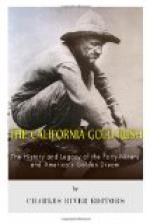Between 1830 and 1840, however, Americans of a different type began to present themselves. Southwest of the Missouri River the ancient town of Santa Fe attracted trappers and traders of all nations and from all parts of the great West. There they met to exchange their wares and to organize new expeditions into the remote territories. Some of them naturally found their way across the western mountains into California. One of the most notable was James Pattie, whose personal narrative is well worth reading. These men were bold, hardy, rough, energetic, with little patience for the refinements of life—in fact, diametrically opposed in character to the easy-going inhabitants of California. Contempt on the one side and distrust on the other were inevitable. The trappers and traders, together with the deserters from whalers and other ships, banded together in small communities of the rough type familiar to any observer of our frontier communities. They looked down upon and despised the “greasers,” who in turn did everything in their power to harass them by political and other means.
At first isolated parties, such as those of Jedediah Smith, the Patties, and some others, had been imprisoned or banished eastward over the Rockies. The pressure of increasing numbers, combined with the rather idle carelessness into which all California-Spanish regulations seemed at length to fall, later nullified this drastic policy. Notorious among these men was one Isaac Graham, an American trapper, who had become weary of wandering and had settled near Natividad. There he established a small distillery, and in consequence drew about him all the rough and idle characters of the country. Some were trappers, some sailors; a few were Mexicans and renegade Indians. Over all of these Graham obtained an absolute control. They were most of them of a belligerent nature and expert shots, accustomed to taking care of themselves in the wilds. This little band, though it consisted of only thirty-nine members, was therefore considered formidable.
A rumor that these people were plotting an uprising for the purpose of overturning the government aroused Governor Alvarado to action. It is probable that the rumors in question were merely the reports of boastful drunken vaporings and would better have been ignored. However, at this time Alvarado, recently arisen to power through the usual revolutionary tactics, felt himself not entirely secure in his new position. He needed some distraction, and he therefore seized upon the rumor of Graham’s uprising as a means of solidifying his influence—an expedient not unknown to modern rulers. He therefore ordered the prefect Castro to arrest the party. This was done by surprise. Graham and his companions were taken from their beds, placed upon a ship at Monterey, and exiled to San Blas, to be eventually delivered to the Mexican authorities. There they were held in prison for some months, but being at last released through the efforts of an American lawyer, most of them returned to California rather better off than before their arrest. It is typical of the vacillating Californian policy of the day that, on their return, Graham and his riflemen were at once made use of by one of the revolutionary parties as a reinforcement to their military power!




